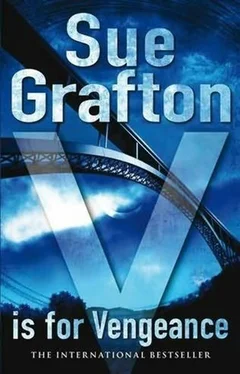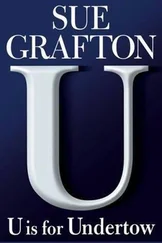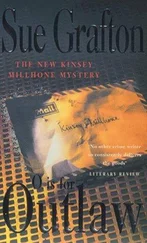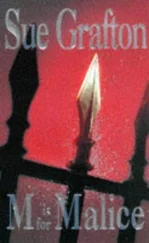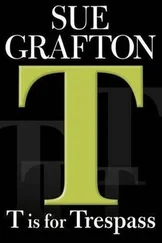Nora smiled to herself. What a liar he was. Thelma had probably been tapped as his date since the invitation crossed her desk. No telling how many social engagements she’d redirected to her own personal use. Nora knew perfectly well Channing hadn’t warned her in advance because he wanted to catch her flat-footed. He made a point of putting her in a bind so her refusal to go would be her fault instead of his.
“I don’t want you to have to go by yourself,” she said. “You poor dear. I thought I’d put a call through to Meredith and see if she and Abner want to meet for drinks ahead of time. That way, we could all go in one car.”
Channing’s response was smooth, but she knew him well enough to sense his desperation. By capitulating, she’d gained the upper hand and put the burden back on him. He was committed by now. Thelma fully expected to go as his date and he could hardly turn around and tell her he’d be attending with his wife. “I appreciate the offer. Really, it’s more than generous, but why don’t we take a rain check. Next time our schedules conflict, I’ll call in my marker.”
“You promise?”
“Promise.”
“Good. Then we have a deal. Next time I swear I’ll go without making a fuss.”
“Perfect. I’d like that.”
“Meanwhile, enjoy yourself.”
“I’ll do my best. Full report afterward.”
“Love you.”
“You too,” he said. “I’ve got another call coming in.”
As soon as she was off the phone, Nora picked up her handbag and car keys. She stuck her head in the kitchen, where Mrs. Stumbo was down on her hands and knees scrubbing the floor.
“I have some appointments this afternoon, but I should be back by five. As soon as you finish, why don’t you take the rest of the day off. You’ve been working way too hard.”
“Thank you. I could use the time.”
“Just be sure to lock up. We’ll see you tomorrow.”
Within minutes, she was heading south on the 101. She took pleasure in the drive because it gave her an opportunity to conduct an emotional self-examination. She needed to assess the situation with all the calm she could muster. She knew she was right about Thelma, but so far she had no proof. It didn’t have to be evidence that would stand up in court. The situation would probably never come to that, but she wanted the satisfaction of knowing she was right. Poor substitute for having her marriage intact. Channing made a point of keeping his credit card statements at the office so there was no way to determine when he and Thelma had first hopped in the sack. Looking back, she could probably pinpoint the business trip where it all began.
Repeat encounters wouldn’t have been conducted at the office because privacy there was in short supply. Half the partners worked late, showing up at all hours to finish business that couldn’t be squeezed into the typical ten-hour day. Channing and his beloved Thelma, the whore, would have cavorted at the house in Malibu, thus saving the expense of a hotel room. Nora would have to boil the sheets before she slept in her own bed again.
She spotted a CHP black-and-white lurking at an overpass, invisible to northbound traffic. She glanced down at the speedometer needle, which wavered between eighty-seven and ninety miles an hour. She took her foot off the accelerator and put her racing thoughts in neutral. Maybe she was more stressed out about Thelma than she knew. In her mind, once she’d recovered from her initial humiliation, she’d felt curiously detached. The fact that her husband was involved with someone so common left her more insulted than devastated. From a practical standpoint, she could see how convenience and proximity made Thelma the logical choice. Channing’s moral sensibilities were finely tuned. He would never screw around with another attorney in the firm and certainly not with one of his partners’ wives. He was much too pragmatic to risk a breach of that magnitude. A violation of professional ethics could well blow up in his face. There were certainly countless Hollywood actresses, clients of his, who’d have jumped at the chance to seduce and be seduced, but that was another line he wouldn’t cross. Thelma was a hireling, one down by definition. If the affair turned sour and he ended up firing her, she might sue for sexual harassment, but that was probably the worst she could do. Knowing Channing, he’d already set up safeguards against the day.
What puzzled her was that aside from her injured pride and innate snobbery where Thelma was concerned, she felt no sense of betrayal. There was no question Channing had deceived her. After the surprise wore off, she’d expected to feel outrage or anguish or loss, some fierce emotional response. In that first flash, she’d pictured a furious confrontation, accusations, recriminations, bitter tears, and remonstrances. Instead, the revelation simply allowed her to step away from her life and take another look. She had no doubt the affair would have an impact, but for the moment she couldn’t anticipate the form it would take. She was operating on autopilot, going about her business as though nothing had changed.
An hour and a half later, she turned left off Pacific Coast Highway onto the steep, twisting road that led to their primary residence. Channing had purchased the last buildable half acre along the ridge. The lot was dominated by the sprawling glass-and-steel structure he’d commissioned. She experienced a strange form of agoraphobia each time she returned. There were no trees and therefore no shade. The views were stunning, but the air was dry and the sunlight was unrelenting. During the rainy season, the road would wash out and the occasional mud slide would make passage impossible. A brush fire of the most inconsequential sort could easily sweep up the hill, gaining momentum, sucking in fuel until it engulfed everything in its path.
Behind the house, mountains rose implacably, shaggy with chaparral and low-growing scrub. Paddle cactus had taken over the steep clay slopes, which were laced with old animal paths and fire roads. Most of the year, the surrounding hills were a dry brown, and the fire danger was constant. Channing’s solution to the endless months without rain was to have a Japanese landscape architect create monochromatic gardens composed of gravel and stone. Boulders, chosen for their shape and size, were set in sand beds in asymmetrical arrangements that seemed studied and artificial. Lines were carefully raked from stone to stone, sometimes in straight rows, sometimes in circles meant to simulate water. Flat limestone slabs had been laid in the sand to serve as stepping stones, but they were too widely spaced for Nora’s stride, which forced her to adopt a mincing gait, as though her feet had been bound.
The landscape architect had spoken to them at length about simplicity and functionality, concepts that appealed to Channing, who was no doubt congratulating himself for the reduction in his water bill. For Nora, the carefully composed patterns generated an almost overpowering desire to scuffle her feet, making a proper mess out of everything. Nora was a Pisces, a water baby, and she complained to Channing about how out of her element she felt in the arid environment. He was gone all day, happily ensconced in his air-conditioned offices in Century City. The house was also air-conditioned, but the sun pounding on the wide expanses of glass left the interior smelling stuffy. She was the one stuck on a mountaintop where the house was totally exposed. His concession was the addition of a shallow reflecting pool at the front of the house. Nora took an absurd pleasure in the stillness of the surface, like a mirror on which the cloudless blue sky shimmered with the faintest breeze.
She turned into the drive and left her car on the parking pad beside the gardener’s battered pickup truck. She glanced over at the wide gravel circle where the full-time Japanese gardener, Mr. Ishiguro, squatted on his heels, removing pine needles. He’d worked for the Vogelsangs since the gardens went in. He’d come highly recommended by the landscape architect, but Nora would have been hard-pressed to describe what he did all day, fussing about with his wheelbarrow and his bamboo rake. He had to be in his late seventies, wiry and energetic. He wore a gray tunic over baggy dark blue farmer pants. A wide canvas hat shielded his face from the sun.
Читать дальше
